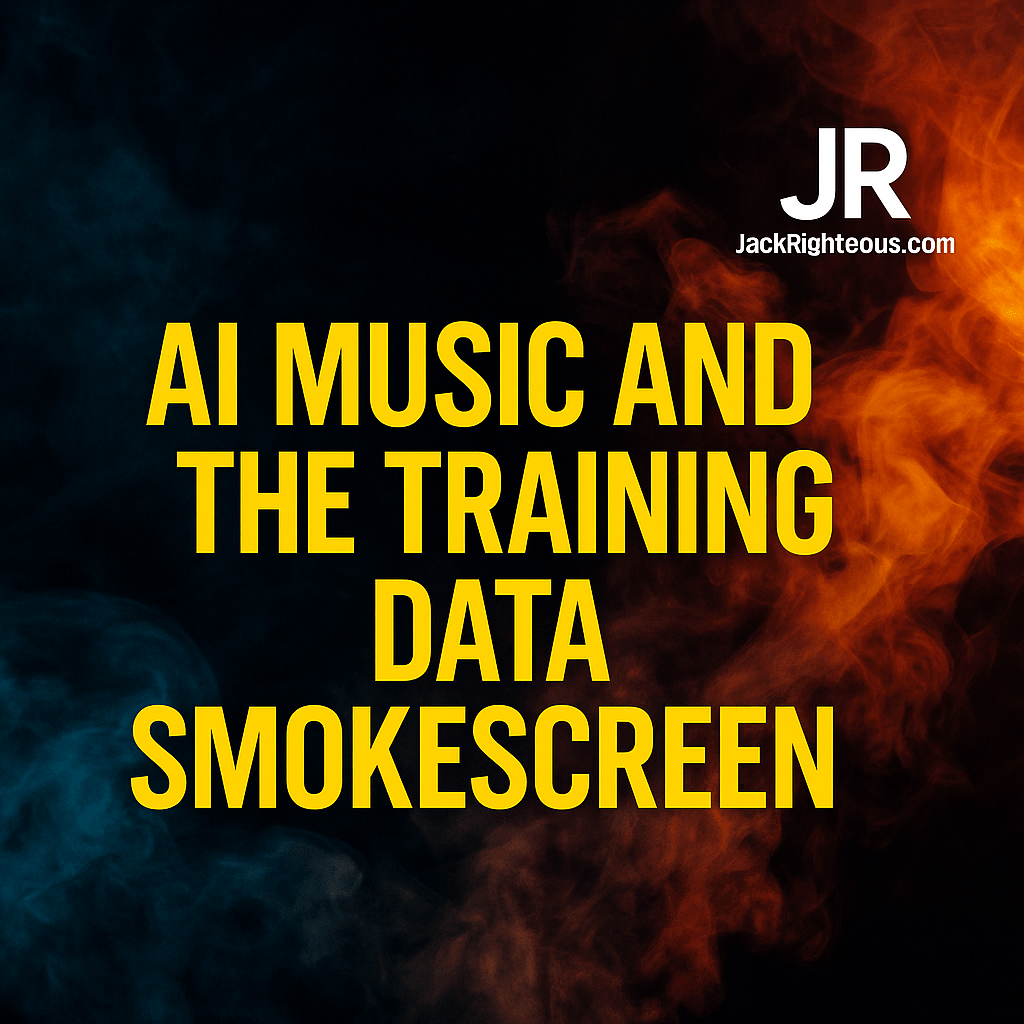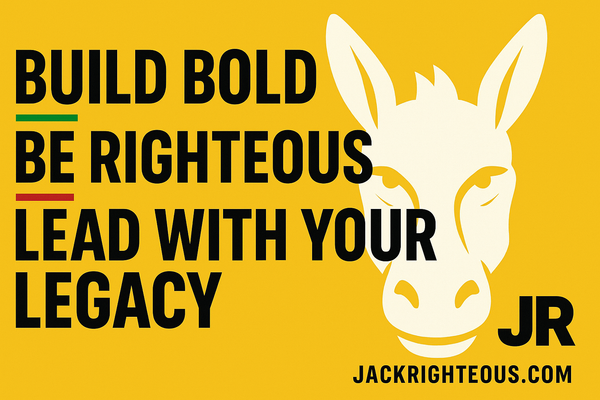
AI Music and the Training Data Smokescreen
Gary WhittakerAI Music and the New Misinformation Machine
What COVID Taught Us About How Narratives Get Built — and What’s Really Going on With the “Training Model” Panic
🔥 Update – July 6, 2025
Since publishing this article, I’ve received multiple death threats for speaking plainly about AI music and copyright law.
Let me be clear:
I take every threat seriously.
All messages containing violent or harassing content are being documented, investigated, and forwarded to the appropriate authorities — including platform moderators and legal channels where necessary.
If your goal was to silence this message, you just amplified it.
And now it has a soundtrack:
🎧 Listen to the response track: “Mic in My Hand (Book of War)”
Built in Suno, forged in truth:
👉 https://suno.com/s/OMyaFFtSBY4zPJMQ
I don’t run. I don’t bow. I build.
And I’ll keep building.
— Jack Righteous
Back in June 2021, Jon Stewart sat across from Stephen Colbert and did something rare on late-night TV: he broke the script. While most of the media was still circling the wagons around the idea that the COVID-19 virus couldn’t possibly have originated from the Wuhan coronavirus lab — despite the name, the location, and common sense — Stewart ridiculed the logic right to Colbert’s face. And the audience didn’t quite know what to do with it.
You could feel the tension in the room: laughter, discomfort, disbelief. But Stewart didn’t flinch. Because deep down, everyone already knew the possibility was valid — they just weren’t allowed to say it yet.
It was a moment that exposed how fragile the “approved narrative” really was. And how fast media, institutions, and public discourse can unite around a version of the truth that is, frankly, anything but.
Fast forward to today, and I’m watching the same machinery spin up again.
Only this time, it’s not about viruses.
It’s about AI music.
The “Training Model” Smokescreen
Right now, one of the loudest and most repeated arguments from AI music critics — especially those aligned with legacy music institutions — is that the way AI models are trained is unethical. They claim that since tools like Suno or others are trained on massive datasets (which might include copyrighted works), the entire output is tainted. Illegitimate. Dangerous.
It sounds serious. It sounds technical. It sounds like they care about artists.
But it’s a false narrative. A distraction.
A modern-day version of the “masks will save us” storyline — continued long after the science made it clear that the real damage was coming from somewhere else.
Because here’s the truth they’re not saying — and probably hope you never learn:
Copyright law already handles this.
It doesn’t care how a work was inspired, trained, or initiated.
It only cares what was copied — and if the final output is infringing.
That’s been the rule for decades. It’s how we treat sampling. It’s how we treat accidental plagiarism. It’s how we treat inspiration.
So why would AI suddenly be different?
It isn’t.
And the people pushing the “training model” panic know it.
Disclaimer: I’m not a lawyer. What follows is based on publicly available court rulings, my experience as an AI music creator, and research into current copyright law. For legal advice, consult a qualified attorney.
The Law Has Already Spoken — And It’s Not on Their Side
Recent court decisions in the U.S. and U.K. have made something else very clear:
If you use simple prompts to create something — a song, a story, a piece of art — you don’t own it unless you contribute something uniquely human.
That means AI-generated output isn’t copyrightable by default.
That’s not a glitch — it’s the law doing its job.
So not only is there no threat — there’s a legal barrier preventing bad actors from abusing the system.
The only way you can make a copyright claim is by showing your human involvement: refinement, arrangement, editing, creative decisions.
Which, by the way, is how music creators have always worked.
📊 Where the Law Stands on AI-Generated Content (as of 2025):
U.S. courts: AI-only works = not copyrightable (2023–2025)
Human authorship is the legal standard
Training model lawsuits are ongoing but don’t block the use of AI tools
Tools like Suno disclaim copyright unless human input is added
Inspiration ≠ Infringement — and It Never Has
Let’s take this a step further.
Even massive corporations — with all their lawyers and legal rights — can’t stop someone from listening to their music and being influenced by it.
They can only take action if someone directly copies protected elements.
So how is that different from how AI models work?
It isn’t.
Claiming otherwise is intellectual dishonesty. And frankly, a desperate attempt to make people fear something they’re not supposed to understand.
⚠️ This Isn’t About Ethics — It’s About Control
If you’ve read this far, here’s what I really want to say:
This isn’t about protecting artists.
It’s about protecting power.
It’s about gatekeepers — labels, rights holders, “industry experts” — trying to shut the door now that the rest of us finally have the tools to walk through it.
They don’t want you to learn the tools.
They want you to fear them.
Because once you know how to use AI music the right way — ethically, legally, creatively — their entire narrative falls apart.
Just like it did on Colbert’s couch that night in 2021.
This isn’t a copyright crisis — it’s a copyright smokescreen.
What You Can Do Now
-
Learn the tools
-
Understand your rights
-
Ignore the noise
-
Build anyway
The future of music isn’t about who yells the loudest.
It’s about who creates the most freely, fearlessly, and truthfully.
Stay focused. Stay independent. And stay moving.
This article reflects my real-world experience using AI music tools, supported by publicly available legal cases and rulings as of 2025. For full citations or updates, revisit this page at JackRighteous.com as new developments unfold.
Ready to Launch or Level Up Your AI Music Journey?
🔹 Start Here – The Suno AI Creator Guide:
https://jackrighteous.com/pages/suno-guide-getting-started
🔹 Learn to Brand with Sound – GET JACKED Into Suno Branding:
https://jackrighteous.com/pages/start-ai-music-branding
🔹 Unlock the Full Anthem Path – GET RIGHTEOUS System Access:
https://jackrighteous.com/pages/get-righteous-anthem-guide
(Requires one of the following:
– https://jackrighteous.com/products/get-jacked-full-pro-kit
– https://jackrighteous.com/products/get-jacked-pro-ai-music-kit
– https://jackrighteous.com/products/sanctuary-digital-download-support-the-album-build)


8 commentaires
🔒 Statement on Free Speech, AI Extremism, and Threats
I’m a strong supporter of free speech — including disagreement. Civil debate is welcome here. But threats, bullying, and intimidation are not.
When it comes to anti-AI extremism, I need to be even clearer: there is no conversation to be had with those who think threatening people is justified. To make that point visible, I’ve left some of the threats posted — the rest will be removed unless they offer actual value to the discussion.
Yes, there are real risks with AI. Some credible PhDs believe we may have already crossed a line we can’t reverse — something I plan to explore in future posts. That matters. But attacking individual creators or AI proponents is misguided. AI is being deployed at massive scale by governments and corporations. Targeting individuals solves nothing.
If you’re making threats because you think you’re saving the world — you’ve lost your way. And I say that as someone who has been in dark places, too. You’re not unique. You’re not alone. But you are wrong.
You think you’re crazy? So am I. So are all of us when pushed hard enough. That doesn’t make you special — it just means you’re human.
And if you’re threatening others, it’s time to stop and get help. Not just for them — but for yourself.
— Jack Righteous
And we are prepared to bite you.
Love the supporters on this tread! what a great youtube video! Not only are all these extremists snakes, they can only crawl on their bellies before me.
Let’s make it a party, Jack!
https://www.youtube.com/watch?v=7BvuR0zgFQs
Oh, look. Another AI-lover to the slaughter.
https://www.youtube.com/watch?v=_x_LNTFXNT8